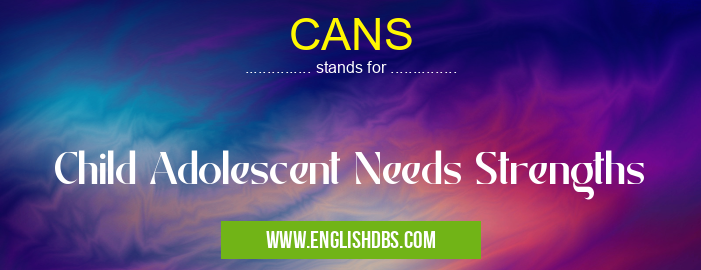What does CANS mean in UNCLASSIFIED
CANS is an acronym that stands for Child Adolescent Needs Strengths. It is a standardized assessment tool used to evaluate the mental health and behavioral needs of children and adolescents. The CANS assessment is widely used by mental health professionals, social workers, and educators to gather information about a child or adolescent's strengths and weaknesses, as well as their needs for support and services.

CANS meaning in Unclassified in Miscellaneous
CANS mostly used in an acronym Unclassified in Category Miscellaneous that means Child Adolescent Needs Strengths
Shorthand: CANS,
Full Form: Child Adolescent Needs Strengths
For more information of "Child Adolescent Needs Strengths", see the section below.
What does CANS Stand for?
CANS stands for:
- Child
- Adolescent
- Needs
- Strengths
CANS Assessment
The CANS assessment is a comprehensive tool that covers a wide range of areas, including:
- Developmental history
- Family history
- School performance
- Social relationships
- Emotional and behavioral problems
- Substance use
- Trauma exposure
- Strengths and protective factors
The CANS assessment is typically administered by a trained professional, such as a psychologist, social worker, or counselor. The assessment can be completed in a single session or over several sessions.
Benefits of the CANS Assessment
The CANS assessment provides a number of benefits, including:
- Comprehensive assessment: The CANS assessment covers a wide range of areas, providing a comprehensive picture of a child or adolescent's mental health and behavioral needs.
- Standardized: The CANS assessment is a standardized tool, meaning that it is administered and scored in the same way by all professionals. This ensures that the results are reliable and valid.
- Objective: The CANS assessment is an objective tool, meaning that it is not influenced by the subjective opinions of the professional administering the assessment.
- Useful for planning services: The results of the CANS assessment can be used to develop an individualized treatment plan for a child or adolescent.
Essential Questions and Answers on Child Adolescent Needs Strengths in "MISCELLANEOUS»UNFILED"
What is the CANS assessment?
The Child and Adolescent Needs and Strengths (CANS) assessment is a standardized, structured, and validated tool used to assess the strengths and needs of children and adolescents between the ages of 4 and 18 who are receiving publicly funded mental health services. It provides a comprehensive profile of the child's or adolescent's functioning in various domains, including emotional/behavioral, school, family, peer relationships, and substance use. The CANS assessment helps clinicians develop individualized treatment plans and track progress over time.
What are the benefits of using the CANS assessment?
Using the CANS assessment offers several benefits, including:
- Provides a comprehensive understanding of the child's or adolescent's strengths and needs.
- Facilitates the development of individualized and evidence-based treatment plans.
- Monitors progress and evaluates the effectiveness of interventions.
- Enhances communication and collaboration among providers, families, and other stakeholders.
- Supports informed decision-making and resource allocation.
How is the CANS assessment conducted?
The CANS assessment is typically conducted by a trained clinician during an in-person interview with the child or adolescent and their caregiver(s). The clinician asks a series of questions and observes the child's or adolescent's behavior during the interview. The assessment can take approximately 60-90 minutes to complete.
What information does the CANS assessment gather?
The CANS assessment gathers information in the following domains:
- Emotional/behavioral functioning: This includes assessing symptoms of mental health disorders, emotional regulation, and behavioral problems.
- School functioning: This includes assessing academic performance, attendance, and engagement in school activities.
- Family functioning: This includes assessing family structure, relationships, and support systems.
- Peer relationships: This includes assessing the child's or adolescent's social skills, friendships, and interactions with peers.
- Substance use: This includes assessing the child's or adolescent's use of alcohol, tobacco, and other drugs.
How are the results of the CANS assessment used?
The results of the CANS assessment are used to develop individualized treatment plans that address the child's or adolescent's specific needs. The assessment can also be used to track progress over time and evaluate the effectiveness of interventions. The results can also inform decision-making regarding resource allocation and service planning.
Final Words: The CANS assessment is a valuable tool for assessing the mental health and behavioral needs of children and adolescents. The assessment provides a comprehensive and objective picture of a child or adolescent's strengths and weaknesses, as well as their needs for support and services. The results of the CANS assessment can be used to develop an individualized treatment plan that will help the child or adolescent achieve their full potential.
CANS also stands for: |
|
| All stands for CANS |
